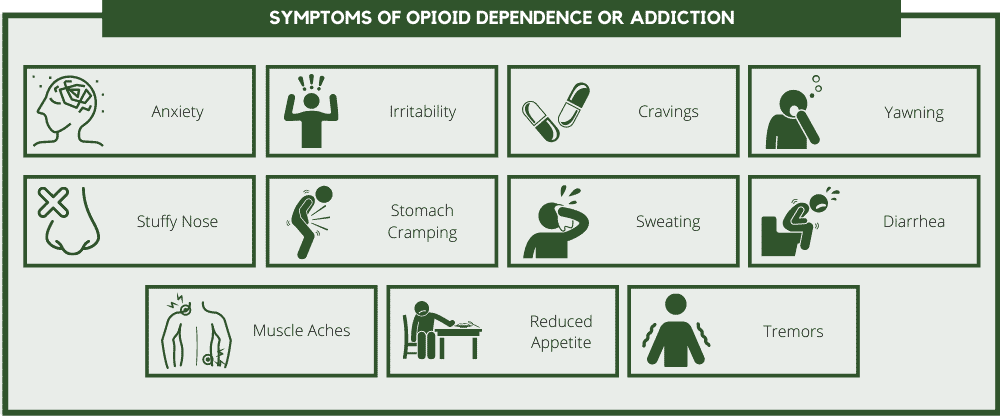Opioid addiction is extremely common in the United States. Millions of adults struggle with physical dependence on opioids after receiving a prescription for opiate pain relievers or taking them recreationally. Commonly prescribed opioid medications include fentanyl, morphine, codeine, oxycodone, Percocet, and Vicodin.
When used exactly as prescribed, opioid pain relievers can be safe and effective. However, in addition to relieving pain, opioid drugs produce a high or euphoric feeling that can prompt people to take them longer than prescribed or at a higher dose. The potential for people to become addicted to opioid medications is high, even if a person does not have a history of substance abuse or addiction.
Fortunately, there are several ways opioid addiction treatment programs in Massachusetts can help.

Symptoms of Opioid Dependence or Addiction
If you are taking opioid medications, you should monitor yourself for symptoms that indicate you may be developing dependence on the drug. There are some symptoms of opioid use that could indicate you are not using the drug correctly, including:[1]
- Anxiety
- Irritability
- Cravings for the medication
- Yawning
- Stuffy nose
- Stomach cramping
- Sweating
- Diarrhea
- Muscle Aches
- Reduced appetite
- Tremors
While these symptoms are not necessarily dangerous, they can be very uncomfortable and may mean that you are taking a dose of the opioid medication that is too high for your body to handle safely. It is important to also be aware of signs that you have become addicted to opioid medication. These include:
- Taking more of the medication than you are supposed to
- Continuing to take the medication longer than prescribed
- Taking the medication for a different purpose than prescribed, such as to help with social anxiety or to get “high”
- Spending a lot of time thinking about the medication, especially about when you get to take it next
- Taking someone else’s prescription opioid medication
Any of these symptoms could indicate that you could benefit from opioid addiction treatment in Massachusetts.
What to Expect From Opioid Addiction Treatment in Massachusetts
To have the best chance of a full recovery from addiction, people must receive treatment that addresses not only the physical aspects of addiction but the emotional and social parts, too. Addiction treatment for opioids generally happens in stages.
Evaluation
You will go through an evaluation that includes a medical and mental health exam and questions about the length and severity of your addiction. This allows your treatment team to create a tailored treatment plan that will meet your individual needs.
Detox
Many people who live with opioid addiction require medically supervised detox. During detox, you will be monitored and treated for uncomfortable or dangerous withdrawal symptoms. You will also be kept away from opioids while your cravings are likely to be very strong. This allows you to have a safe, complete, and comfortable withdrawal from opioids. Some medications, such as Suboxone or Subutex, may be administered to help keep you comfortable during detox.[2]
Treatment
After detox, you will participate in a treatment plan designed to support your whole self. Medication-Assisted Treatment (MAT) is often used to treat substance use disorders and opioid addiction. In this type of program, you will receive medications like Suboxone or Vivitrol, which allow your body to adjust to the absence of the opioids you were taking.[3] You will also undergo individual and group therapy to help you learn the skills you will need to avoid a relapse in the future.
Aftercare
In treatment, you will begin to form your aftercare plan. Since addiction can never be cured, you must find ways to stay active and engaged in recovery for the rest of your life. This could include continuing therapy, joining an alumni group, or engaging in holistic therapies that were helpful during treatment.
How to Find Opioid Addiction Treatment in Massachusetts
While many facilities offer detox and addiction treatment services, it is important to find one that will give you tailored, high-quality treatment. When looking for opioid treatment in Massachusetts, look for the following things:
- Staff must be trained to offer addiction treatment
- Facility is licensed
- Appropriate staff to client ratio
- Strict admission criteria
- Calm environment
- Tailored treatment plans
- Flexible payment options
When choosing an addiction treatment program, ask questions about the staff, the program, how they handle relapses, and any other questions you have. Make sure the majority of the time spent in the program will be spent engaging in evidence-based treatments. Most importantly, make sure you feel comfortable receiving treatment there. There is no one-size-fits-all approach for treating opioid addiction, and you must find the facility that can offer you the treatment you need.

Get The Care You Need and Deserve
Woburn Addiction Treatment is a leader in the addiction treatment field, with proven success in facilitating long-term recovery. Our team of top clinical & medical experts specializes in treating addiction coupled with mental illness, ensuring that each person receives individualized care. Call us – we’re available 24/day, 7 days/week.
Get Started With Our Opioid Rehab Program in Woburn Today
If you or someone you love requires opioid addiction treatment, reach out to the staff at Woburn Addiction Treatment. We offer high-quality, compassionate addiction treatment. At Woburn Addiction Treatment, we believe that anyone can recover from addiction if they have the right support. If you have been waiting for addiction treatment, don’t wait another day. Call today to speak to one of our admissions counselors about our adaptable treatment programs in Massachusetts.
References:


